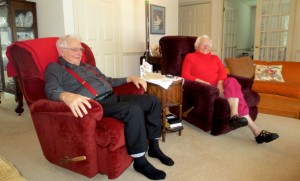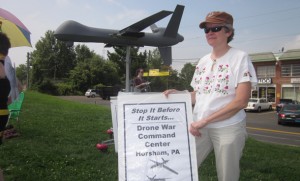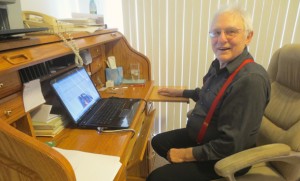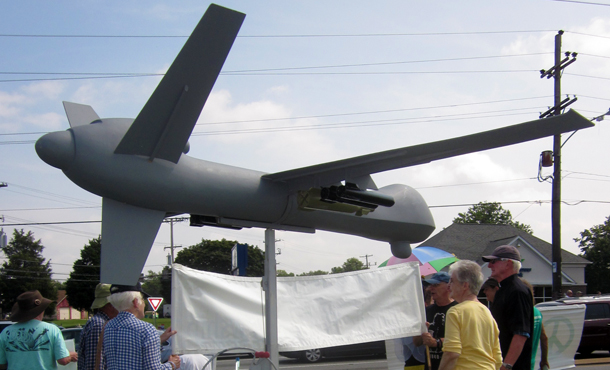“He needs me to go with him when he has the drone,” Marie Riehl says, referring to her husband, Daniel. It takes both Riehls to load this drone into their vehicle. Behind the driver’s wheel, Daniel relies on Marie’s eyes to compensate for his partly obstructed view.
Interviewed in their living room, the Riehls speak of drones that conduct surveillance and drop bombs, of military bases, activist contacts across the country, disseminating information, warfare. An eavesdropper picking up snippets of their thoughts might peg them as spies or covert military operators, or perhaps violent revolutionaries or dangerous criminals.

But this couple, both in their early 80s, are peace activists utterly committed to nonviolence.
“What can I do to stop our wars?” says Daniel, a retired physician. He has hope, though: “If people get information, they might do something about it.”
In the late 1950s, at what was then Eastern Mennonite College, Marie Keener studied elementary education before graduating with a nursing degree; E. (for Evan) Daniel Riehl was a chemistry major. Raised in opposite corners of Lancaster County, Pa., they re-settled in southeastern Pennsylvania as a married couple. He worked with the state public health department for many years, then as a medical consultant for DuPont. She mainly focused on their home and raising their three children, Jan Marcia Orndorf ’85 (now a teacher and pastor), Eric (computer professional) and Carl (lawyer). The Riehls have two grandchildren.
Hundreds of hours protesting wars
In recent years Daniel and Marie spend much of their time as enthusiastically engaged activists, going to places near and far from home to communicate their anti-war messages. “I’ve spent hundreds of hours on street corners protesting wars,” Daniel says.
Among other activities, they frequently borrow the model drone from its owners, the Wilmington, Del., chapter of Pacem in Terris, and haul it around in an effort to inform folks. It’s a 1:5 scale model of a Reaper—an unmanned, remote-controlled aircraft that the U.S. Air Force and CIA use for reconnaissance and for launching missile strikes in places like Yemen and Pakistan.
“The first time we hauled the drone,” Daniel recounts, “we had it in the wrong way, with the back end in front. I could hardly see over the top.”

The duo has since learned that the drone fits into their car better with the front end facing towards the windshield. And it still only just fits. When in place, the fuselage protrudes through the gap between the front seats of their 2006 Toyota Prius Hybrid, occupying the space between the driver’s and passenger’s heads.
For International Education Week at EMU in November 2013, the Riehls transported the drone nearly three hours from its storage place in Delaware to Harrisonburg, where it was positioned by the main-floor picture windows in the Campus Center. The exhibit was organized after a mutual acquaintance put the Riehls in touch with campus pastor Brian Martin Burkholder, who helped round up students to hand out flyers about the child victims of drone attacks.
The Riehls also do street vigils, screen films, join demonstrations, and write articles and letters to the editor. Daniel is the author of a piece in Mennonite World Review, “Known by our drones,” and one on the web site of The Mennonite, “Why I became a peace activist.” The pair’s annual calendar includes a trip to Georgia to join the School of the Americas Watch protest. They are also involved with various organizations and groups near their residence in the Landis Homes retirement community in Lititz, Pa.
‘Killing Muslim civilians is savagery’
For the last three years, the Riehls have played leadership roles in a small group called 1040 for Peace, which aims to create a national movement of taxpayers who withhold $10.40 each year from their federal tax payments as a symbolic gesture against military spending. The pair first used the drone replica as part of their work with 1040, taking it on a tour of six venues in Pennsylvania. The model drone also makes frequent appearances at monthly protests in Horsham, Pa., where a command center for drone operations is planned.
“The purpose of our wars is to make the rich people richer. And the rich people – the defense companies – put the people in Congress who they want,” Daniel says. “The military-industrial complex rules our nation for the good of the very wealthy at the expense of the poor.
“Killing civilians in Muslim countries like Pakistan, Somalia, and Yemen is savagery,” he continues. “The war in Waziristan, the drones are flying 24/7. One person said he saw nine drones at once flying around. And they are very scary because you don’t know when they’re going to shoot you.”

Daniel is the more vocal of the pair, a fount of ideas and energy. Marie seems to provide the moral and grounded direction for the pair. ”My wife got me started. She advised that I take a course on Latin American cultures,” Daniel says. ”It made me realize what was really going on.”
The Riehls seem determined to continue to educate themselves so they can continue to educate others. ”I don’t think any of the churches are doing their jobs,” says Daniel. “The churches, including the Mennonite church, facilitate the crimes of our government. I think we should talk about these things a little bit more.” The Riehls offer their criticisms as devoted Mennonites – they are active members of Pilgrim’s Mennonite Church in Akron, Pa.
During their times of relaxation, Daniel and Marie enjoy exercising and taking in the tranquil views of farmland surrounding their community of retirees.
Asked about possible downsides of the couple’s golden-years activism, Daniel offers two responses. ”Marie gets tired of driving,” and “we used to go on vacations.”

Terrorists who willingly stay in their homes when they know they are targets for a drone strike are knowingly/willingly endangering the lives of their family members. I am more interested in knowing what EMU is doing about promoting peace in Virginia, like at the local abortion clinic. Aborting children is anything but peaceful. Is there a supporting relationship between EMU staff and students and the local Pregnancy Center?